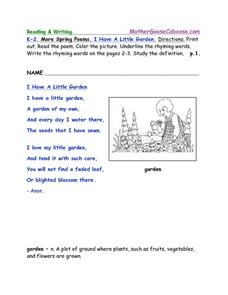Curated OER
Little Dancers Poetry and Vocabulary Worksheet
In this reading and writing activity, students read a poem about ballet dancers and study the vocabulary that is underlined in the poem. They study the definitions that are listed on the second page.
Curated OER
I Have A Little Garden
In this poetry worksheet, students read the poem "I Have A Little Garden," color the picture, underline the rhyming words in the poem and then write the rhyming words on pages two through three.
Curated OER
Let's Fly Our Kites
Students practice reading and writing using a short poem and information about kites. In this kite poem lesson plan, students read and write using a common poem. This lesson plan includes practice with reading, rhyming, handwriting,...
Curated OER
The Caterpillar
In this poetry activity, students read the poem "The Caterpillar," color the picture, underline the rhyming words and then write the rhyming words on pages two through six.
Curated OER
Heaven or Ground Hog Day?
Students discover the ideas of enlightenment by reading historical poetry. In this philosophical lesson, students read poems by Sir Walter Scott and Sergeant Joyce Kilmer while discussing the themes of the writing with classmates....
Curated OER
Hope
For this poem worksheet, students read the poem Hope by Emily Dickinson and answer multiple choice questions and complete a word search. Students complete 2 activities.
Curated OER
Introduction to Poetry
Students determine the rhyme scheme of a poem and find examples of similes. For this poetry analysis lesson, students review definitions needed for the topic and analyze the rhyme or rhythm for the example poems. Students also find...
National Endowment for the Humanities
The Poet's Voice: Langston Hughes and You
Middle schoolers complete a unit of lessons that explore the poetic voice of Langston Hughes. They define voice, read and analyze various poems by Langston Hughes, and complete journal entries for each instructional activity.
West Corporation
Making Inferences – Use Your Mind to Read!
How can you tell if someone is happy? The lesson works with elementary and middle school scholars to activate their schema and pay attention to details to make inferences in their daily lives, poetry, and other literature. Cleverly...
Curated OER
The Odyssey Lesson 5
Review the vocabulary from The Odyssey with this fun "I Have, Who Has" game. First, give students random vocabulary cards (included) that say "I have (vocabalary word). Who has (definition of another vocabulary word)?" Students are...
Curated OER
Literary Terms
Seriously, 93 slides of literary terms? Yes, and well worth the time, although perhaps not all at once. The beauty here is in the concise, easy-to-understand definitions for such well-known terms as imagery and personification, as well...
Curated OER
Poetry: Using Prosodic Devices
Students examine poetry examples in free verse focusing on their prosodic elements. After critiquing works by several authors, they write their own poems utilizing such devices as alliteration, repetition, rhyme, and stanzas.
Curated OER
A Twisted Love Poem
High schoolers read poem about dating violence, discuss meaning of the poem, and compose essay about their interpretation and reactions to it.
Curated OER
Poetry and Visualization
Learners use visualization techniques when reading poetry. In this visualization and poetry lesson, students work in groups to present a tableau that depicts a word from the poem as classmates guess the word. Learners then...
Curated OER
More Spring Poems: Buttercups
In this literature learning exercise, students read and discuss the poem "Buttercups," color the picture, underline the rhyming words and then write the rhyming words on pages two and three several times.
Curated OER
More Spring Poems: Fluttering Butterflies
In this literature based worksheet, students read the poem "Fluttering Butterflies," color the picture, underline the rhyming words and then on the lines provided, write the rhyming words on pages two through four several times.
Curated OER
Five Simple Poems
Students listen as the teacher explains what poetry is as well as describes several types of poetry such as haiku, free verse, limerick, cinquain, and an acrostic. Students read examples of each type of poetry. They compose a poem...
Water
Global Water Supply Elementary School Curriculum
Water is the focus of an interdisciplinary unit that brings awareness to its daily use around the world and the importance of conservation. Worksheets challenge scholars to match words and definitions, trace, complete a maze, and solve a...
Curated OER
Figurative Language Project
Want a handy way to remember the difference between metaphors and similes, or allusions and alliteration? Individuals craft their own figurative language booklet, complete with definitions, examples, and illustrations, following...
Curated OER
A P Literary Terms
Is a list of literary terms found frequently on AP English exams of value to test takers? Now there's a rhetorical question. Here's a list that provides definitions for everything from allegory to vernacular. To say the list is...
Curated OER
Archetypal Images and Polarities
Here is a rather esoteric resource that presents the archetypes found in “The Epic of Gilgamesh,” and would be appropriate for a college-level psychology or literature class, or as a teacher resource. Considered the “world’s oldest...
Curated OER
Definition Poetry
Fifth graders are read funny poems by their teacher to introduce them to poetry. They write their own poem related to the season of Autumn or Halloween. They share their individual poems with their classmates and collect them to make a...
Curated OER
What is Poetry and Where Can You Find It?
Middle schoolers examine different types of poetry in music, commercials and printed works. They identify themes of philanthropy in poetry as well. They finally share their findings with the class.
Curated OER
Poetry on the Web
Eighth graders search a website and locate a poem written by a specific poet whose work appears in the grade 8 anthology. After listening to poetry, 8th graders present oral or written examples of imagery and an analysis of the imagery.

























